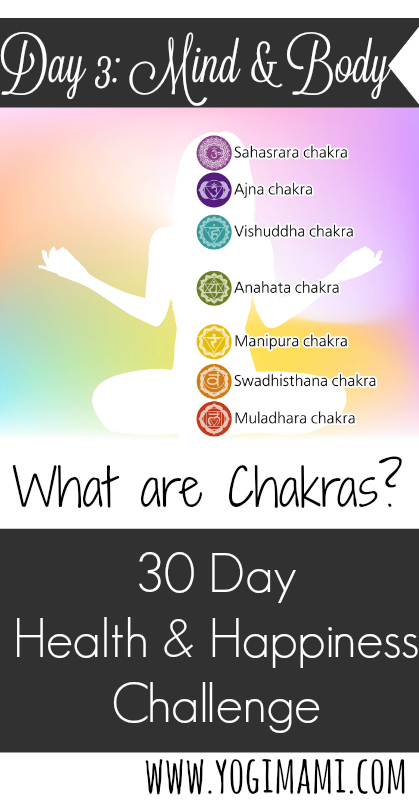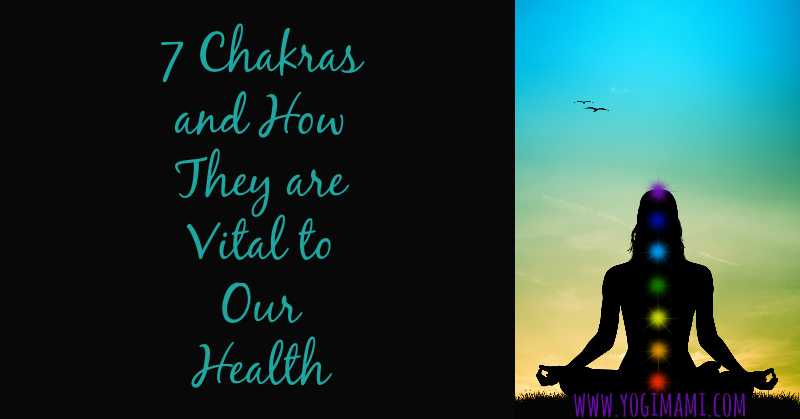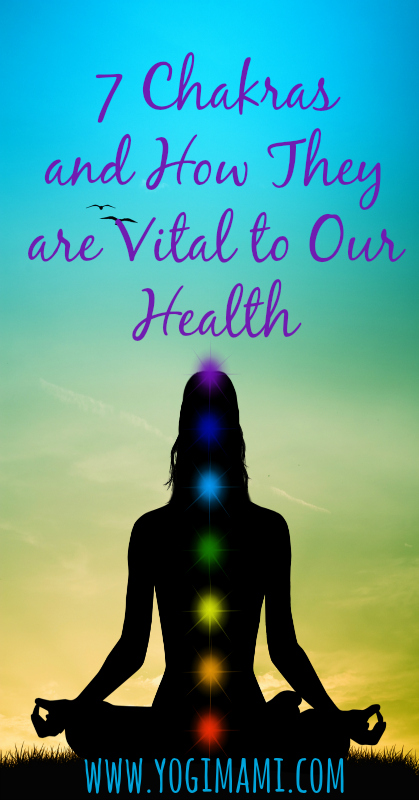PAID ENDORSEMENT DISCLOSURE: In order for me to support my blogging activities, I may receive monetary compensation or other types of remuneration for my endorsement, recommendation, testimonial and/or link to any products or services from this blog. However, I only recommend products or services I have personally used myself and trust.
Yogi Mami/Victoria Moore is a participant in the Amazon Services LLC Associates Program, an affiliate advertising program designed to provide a means for sites to earn advertising fees by advertising and linking to Amazon.com.
Chakras are considered energy sources within the body according to ancient Hindu/Buddhist culture. There are 7 chakras located along the midline of the body and they are believed to regulate our psychological properties. The chakras have different levels of activity and can become blocked which can cause psychological and even emotional problems. Ideally these energy centers would all be open and balanced but this is not always the case.
The 7 Chakras
1. Root Chakra
The root chakra is located at the base of the spine. This Chakra correlates with feeling welcome in situations and how secure you are with yourself. It deals with how we react to the physical and material world. If you suffer from self-awareness issues, insecurity, and often feel fearful or nervous your root chakra is most likely under-active. If you experience greed, materialism, are obsessed with being secure and resist change this chakra is over-active. Other signs of imbalance include anemia, depression, fatigue, low back pain, sciatica, frequent colds and cold hands and/or feet.
2. Sacral Chakra
The second chakra is located on the lower abdomen below the naval and correlates with our feelings and sexuality. If you have no problems dealing with your sexuality, and are passionate and lively your sacral chakra is balanced. If you tend to be over-emotional, become too emotionally attached to people and things or are overly sexual this chakra is over-active. If you have social or intimacy issues, are stiff and unemotional your sacral chakra is under-active. Other symptoms include depression, eating disorders, alcohol/drug abuse, asthma, allergies, yeast infections, UTI’s and impotency.
3. Naval Chakra
The third chakra is located in the abdomen right above the naval, also known as the solar plexus. This Chakra has to do with our self-confidence, ego and personal power. If you are passive and undecisive and timid your naval chakra is under-active. Those who are domineering and aggressive have a chakra that is over-active. Diabetes, digestive disorders, ulcers, extreme nervousness, parasites and colitis are other indicators of an imbalanced naval chakra.
4. Heart Chakra
The Heart Chakra is located in the center of the chest and is associated with love and affection. When you are compassionate, forgive easily and work to establish harmonious relationships your heart chakra is open. If you are cold and distant this chakra is under-active. If you suffocate people with your love, and have selfish reasons for love your heart chakra is over-active. Other symptoms include heart and breathing disorders, high blood pressure, chest pain, immune system problems and muscular tension.
5. Throat Chakra
Chakra #5 is located in the throat region and corresponds with self-expression and talking. If you have no problems expressing yourself and also take the time to listen to others your throat chakra is balanced. If it is under-active you suffer from extreme shyness, lie often and are typically introverted. If you speak too much, are domineering and keep people at a distance your throat chakra is over-active. Other symptoms include thyroid imbalances, hyperactivity, PMS, hormonal disorders, swollen glands, common fevers and flu.
6. Third Eye Chakra
The sixth chakra is located in between the eyebrows and correlates with insight and visualization. When you are intuitive and experience self-realization this chakra is in balance. If you get confused easily, are not good at thinking for yourself or are too rigid in your thinking your third eye chakra is under-active. If you live in a fantasy world or suffer from halucenations this chakra is over-active. Other symptoms include learning disabilities, coordination problems and sleep disorders.
7. Crown Chakra
The last of all the chakras is about wisdom and connecting with the universe. When this chakra is balanced you are unprejudiced and aware of the yourself and the world around. you. You have the concept and spiritual connection with a higher being. Under-active crown chakras are present when there is rigid thinking and a lack of spirituality. If you tend to intellectualize things too much and/or ignore your body’s needs this chakra is over-active. Other symptoms of chakra imbalance include headaches, photosensitivity, brain disorders, coordination problems, mental illness, blood vessel problems and skin rashes.
If you would like to learn more about Chakras you must checkout The Chakra Bible which is a great resource. Stay tuned for a guide on how to balance your chakras for health and well-being.





One Thought on “7 Chakras and How They are Vital to Our Health”
Comments are closed.